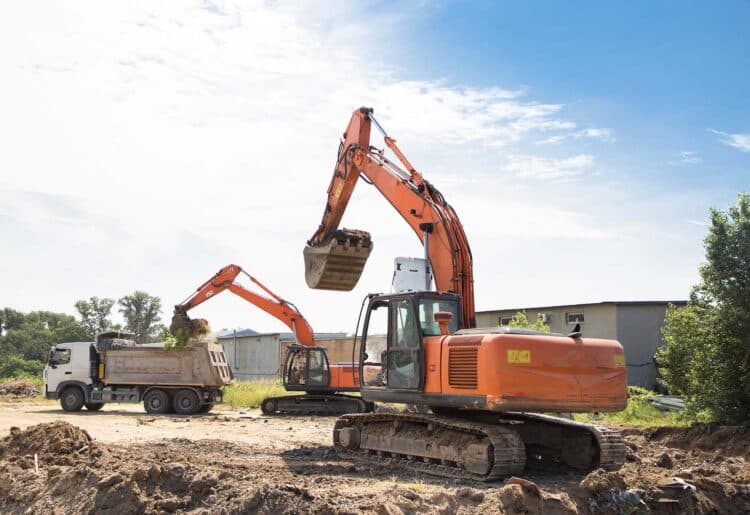Almost every construction project requires excavation services. Most general contractors don’t have the equipment or the expertise to provide them internally, which means the work gets subcontracted to others.
Landscaping companies often need excavation services to help with everything from drainage grating to retaining wall installation.
Your skills in this industry can help you create a successful business, but it takes more than knowledge to develop a profitable opportunity. Long-term outcomes come from having the right equipment, staying positive, understanding the business world, and knowing how to network.
Some business owners might need financial support to stay independent. It can be a time-consuming path to walk when starting an excavation company, but the effort is often worth it!
Starting an Excavation Company
Each state has specific laws, rules, and regulations to follow regarding business registration, licensing, and permits. The information required to begin is available at the local Department of Labor and Industries, Secretary of State’s office, or equivalent government overseer. Some cities require additional licensing, insurance coverage, and surety services.
Before you start an excavation company, you need to think about liability. That means you’ll want to structure your business to protect your personal assets whenever possible.
You’ll find four basic company structures available in most states when forming your excavation business. Here’s a closer look at each one.
- Sole Proprietorship. This business type is the easiest one to start. Most states don’t require you to file any paperwork until you begin serving customers. Even then, you might need a license and insurance, but everything passes through to your personal income. That also means you’re responsible for any liabilities, so all your assets are at risk.
- Partnership. This format is similar to a sole proprietorship, but it includes more than one person in the arrangement. There is no protection for personal assets in most jurisdictions when using this structure.
- Limited Liability Company. An LLC is a popular choice for excavation companies and others in the construction industry because it combines the best of all options. Your business can be structured as a separate entity, which means people must go after its assets instead of your home, car, and cash for personal use. It also delivers pass-through income to keep your tax obligations somewhat limited.
- Corporation. If you expect your excavation company to go public one day or work in a foreign country, this structure might make sense. You can always convert it from an LLC if you achieve enough growth, so it’s usually better to start smaller and grow into this organization type.
You cannot acquire a business license until you declare what organizational structure you plan to use. Corporations and LLCs must file articles of incorporation or similar documentation and pay a fee to be recognized by the state. Annual reports are often necessary, and you might be asked to supply insurance certificates and evidence of skill before being allowed to provide services.
Checklist to Follow for Starting an Excavation Company
Are you considering an excavation business with your skills and expertise? If so, it’s essential to perform your due diligence before opening your doors to customers.
This business startup checklist can help you review the information you’ll need to build the foundation to create a potentially successful experience.
1. Create Your Business Plan
A business plan focuses on the essential elements of your new company. Who are your customers? How do you plan to reach them?
Although this document doesn’t need to be lengthy, it should show projections for your sales and costs, the unique selling point you offer, and how you intend to market your excavation skills.
Each state has different startup expenses to consider, so it helps to add a section that tracks these costs. If you intend to approach a financial institution for help with your startup, you’ll need this information available to review.
2. Form Your Business Entity
At this step, you’ll choose the business structure that makes the most sense for what you’re doing. Most excavation companies should become LLCs.
If you don’t mind doing all the extra administration work, a corporation could make sense in some situations.
It usually costs between $50 to $500 to form an LLC, while the costs can double or triple for corporations.
3. Give Your Business a Name
The best name for your new business venture can be tricky. It needs to reflect who you are, what you do, and remain relevant.
Why does relevancy matter? Before the internet offered widespread access, most people found businesses by looking in their local phone books. The publishing companies behind those resources would offer free and paid listings.
If you wanted to be at the top of the free listings, you had to have a business name that started with A. Once owners realized that being first could lead to increased opportunities, they started adding more A letters to the beginning of their names.
Pretty soon, you had businesses with four, five, or even seven to begin their official business name.
- AAAAA Auto Services
- AAAAAAA Moving Services
- AAAAAwe Inspiring Photographers
It got bad enough that most publishers required businesses to verify their names before agreeing to publish them as a free listing.
Getting found is important, but your name should reflect who you are. Something simple that reflects your brand and describes what you do is a great place to start.
4. Choose Your Location
This part of the business formation process can be time-consuming because you’ll need to find a property with the correct zoning. Most excavation companies must be in a commercial zone, but some might be asked to be in an industrial area.
Your ideal location is somewhere close to other construction agencies so that you can do some networking without requiring an extensive commute.
It should also provide space for your equipment and resources to secure your fleet.
5. Apply for Your Permits and Licenses
In addition to the various business licenses and permits you’ll need to do business, the Internal Revenue Service requires any company (including sole proprietors) with employees to have an Employer Identification Number.
The only way to get out of filing for an EIN is to be a sole proprietor.
Depending on the equipment you operate, a commercial driver’s license might be necessary. Some states require service providers to charge sales tax, so you might need to get a permit there.
6. Open Your Financial Accounts
If you become an LLC, it is imperative for you to separate your personal and business finances. Combining them typically eliminates the separation benefits that this business structure offers.
Most financial institutions provide free business checking accounts, although some minimums sometimes apply.
You’ll want to apply for grants and business loans during this step if you don’t have enough capital available to get your excavation company off the ground independently.
7. Start Marketing
Your excavation company needs to set aside some of its annual budget to promote itself. The good news is that most of the best options for your industry require more time than dollars, including social media, online, and in-person conversations.
If you decide to develop a website, you’ll have more online visibility. You can use drag-and-drop builders during your early days to save some cash, but you’ll want to purchase a domain that reflects your name and brand identity.
8. Hire People
Once you’ve got everything sorted to this point, you’re ready to start hiring some workers. You’ll need to choose people with appropriate licenses and experiences for your new company.
When you have employees, there will be payroll costs to anticipate. Generally, you’ll want to double a worker’s salary to pay for the benefits needed to attract good people.
Insurance Options Required for Excavation Companies
Before obtaining a business license, some states require you to supply evidence that you’ve purchased an appropriate general liability policy.
General liability insurance protects your finances in case something unexpected happens while working. If you’re busy digging and strike an unmarked gas line, the local utility might still require you to pay for its repair or replacement. This coverage will manage those expenses, less your deductible.
Since you’re likely investing in a fleet of vehicles and equipment, you’ll want to have enough insurance available to recover from mechanical issues, accidents, weather-related incidents, or theft if they occur.
Contractors in some states, such as Washington, are required to carry a surety bond in addition to appropriate insurance.
A surety bond is like having an instant credit line. It’s a contract between three parties (you, the provider, and the entity requiring it) to financially guarantee that you’ll act as required when performing work.
If you’re excavating and don’t render services as expected, your client could file a claim against the surety bond to have repairs completed. Your customer can contact another excavator to complete the work.
That means you could be out of the funds from your contract and be asked to pay the replacement funds for the surety bond.
Don’t forget about having workers’ compensation insurance. This policy is often required before you can do business if you’ve hired employees. It covers legal fees and medical bills that you face if someone gets hurt while working. Some small businesses are exempt from this requirement, so you’ll want to review its pros and cons independently.
Should I Start an Excavation Company?
Large excavation companies can earn millions of dollars in revenue annually. Smaller businesses can often reach $10,000 per job, which means one project per week would create half a million dollars before expenses. Before pursuing this opportunity, it is crucial to have the necessary equipment and construction experience.
After losing my job during the Great Recession, I turned to contracting work with the government. It started by cleaning out foreclosed homes so that they could be returned to the real estate market, but that eventually led to doing excavation work.
It was a lot of fun to prepare different sites for construction projects. Depending on the project, you could be moving huge boulders, felling trees, or moving massive piles of dirt. It was a lot like playing with your toys in the sandbox when you were little, but on a much bigger scale.
As a final bit of advice, I’d encourage anyone who wants to get into excavating to review local fee structures. I once took a project to clear trees without realizing the city charged $70 per removed tree. That turned out to be an expensive and unexpected cost since I had to take more than 100 of them off the land.
If you love heavy equipment and have the resources to get going, starting an excavation company could help you love what you do while creating a secure income for yourself and your family. Follow the steps in this guide to maximize the return you can earn.


